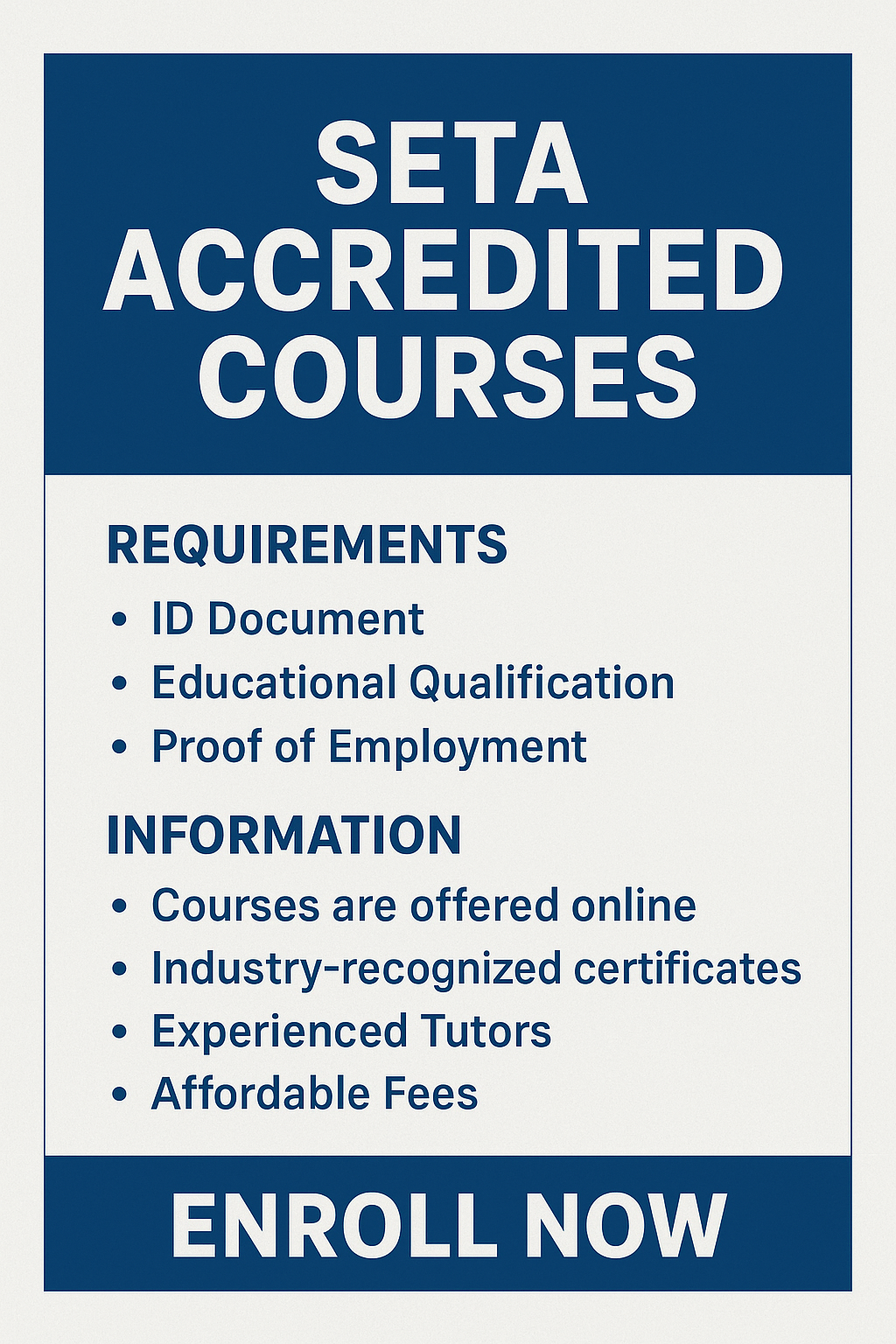SETA Accredited Courses: A Complete Guide
Introduction
Education and skills development play a crucial role in shaping the future of any society. In South Africa, the government has put several systems in place to ensure that citizens are not only educated but also empowered with practical skills that lead to employment and entrepreneurship. One of the most important systems is the Sector Education and Training Authorities (SETA).
SETA-accredited courses have become highly sought-after because they carry official recognition, meet national standards, and provide learners with valuable skills that can open doors to career opportunities. Whether you are a student, a professional looking to upskill, or an employer who wants to invest in staff training, understanding how SETA works and the value of accredited courses is essential.
In this article, we will take an in-depth look at SETA-accredited courses, what they mean, how they work, and why they are beneficial.
What is SETA?
SETA stands for Sector Education and Training Authority. South Africa has 21 different SETAs, each responsible for a specific sector of the economy. For example:
- Services SETA (SSETA): Covers industries like business, banking, and insurance.
- Construction SETA (CETA): Focuses on construction, building, and civil engineering.
- Health and Welfare SETA (HWSETA): Specialises in healthcare, social services, and community work.
- Mining SETA (MQA): Deals with mining and minerals.
The main purpose of SETA is to ensure that training and education within each sector are standardized, relevant, and aligned with the needs of the economy.
What Does SETA Accreditation Mean?
When a course is SETA-accredited, it means that it meets the National Qualifications Framework (NQF) standards set by the South African Qualifications Authority (SAQA).
Key points about accreditation:
- The course has been evaluated and approved by a SETA.
- It provides learners with credits towards nationally recognized qualifications.
- Training providers offering the course must meet strict quality assurance standards.
- Employers recognize these courses as legitimate and valuable.
Benefits of SETA Accredited Courses
Enrolling in a SETA-accredited course comes with several advantages:
1.
National Recognition
The qualification you receive is recognized across South Africa. This makes it easier to find employment or further your studies.
2.
Career Opportunities
Employers often prefer candidates who have completed accredited courses, as this proves they have been trained to industry standards.
3.
Quality Assurance
Accreditation ensures that the course is of high quality, relevant, and delivered by competent training providers.
4.
Pathway to Further Education
Many accredited courses provide credits that can be transferred to higher-level qualifications, such as diplomas or degrees.
5.
Workplace Relevance
SETA-accredited courses are designed in consultation with industries, ensuring that the skills taught are directly applicable to real-world jobs.
Types of SETA Accredited Courses
SETA-accredited courses cover a wide range of industries. Some of the most popular areas include:
1.
Business and Administration
- Office Administration
- Project Management
- Human Resource Management
- Business Communication
2.
Finance and Accounting
- Bookkeeping
- Payroll Administration
- Financial Management
3.
Construction and Engineering
- Bricklaying
- Carpentry
- Electrical Engineering Basics
- Civil Engineering Support
4.
Health and Safety
- Occupational Health and Safety (OHS)
- First Aid Training
- Workplace Safety Management
5.
Hospitality and Tourism
- Food and Beverage Services
- Hotel Management
- Tour Guiding
6.
Information Technology
- Basic Computer Literacy
- Networking Fundamentals
- Software Development
7.
Education and Community Development
- Early Childhood Development (ECD)
- Community Health Work
- Social Auxiliary Work
Who Can Enrol in SETA Accredited Courses?
These courses are designed for a wide range of learners:
- Students: School leavers who want practical skills to enter the job market.
- Employees: Professionals looking to upskill and grow their careers.
- Employers: Businesses investing in staff training to improve productivity.
- Entrepreneurs: Individuals who want to start their own businesses with the right knowledge.
How to Check if a Course is SETA Accredited
Unfortunately, not every training provider that claims to be accredited is legitimate. To ensure you choose the right course:
- Ask for Accreditation Number – Every accredited provider has a SETA accreditation number.
- Verify with SETA – You can contact the relevant SETA directly to confirm the provider’s status.
- Check SAQA Database – The South African Qualifications Authority maintains a record of accredited courses and providers.
SETA Accredited Courses vs. Non-Accredited Courses
It’s important to understand the difference:
- Accredited Course: Recognized nationally, offers credits, and enhances employability.
- Non-Accredited Course: May provide useful skills but does not carry official recognition.
If your goal is career advancement, a SETA-accredited course is almost always the better choice.
Examples of Popular SETA Accredited Qualifications
Here are some qualifications that are widely pursued in South Africa:
- National Certificate in Business Administration Services (NQF Level 4)
- Further Education and Training Certificate in Bookkeeping (NQF Level 4)
- National Certificate in Occupational Health, Safety, and Environment (NQF Level 2–5)
- Early Childhood Development (ECD) Practitioner Certificate
Funding and Learnerships
One of the best things about SETA is that it provides funding opportunities through learnerships, bursaries, and skills programs.
- Learnerships: Structured programs that combine theory with workplace experience.
- Bursaries: Financial support for students studying SETA-accredited qualifications.
- Skills Programs: Shorter courses focusing on specific skills.
These initiatives help reduce unemployment by giving people practical, job-ready training.
How Employers Benefit from SETA Accredited Training
It’s not just learners who benefit—employers also gain:
- Improved Productivity: Employees with updated skills perform better.
- Tax Incentives: Companies that participate in learnerships may qualify for tax benefits.
- Compliance: Many industries require workers to have accredited qualifications for safety and legal reasons.
The Future of SETA Accredited Training
With the world changing rapidly due to technology and globalization, SETA continues to evolve. Future trends include:
- More Online Learning Options: Digital platforms are making accredited training more accessible.
- Focus on Technology Skills: Courses in IT, coding, and digital marketing are growing.
- Entrepreneurship Development: Helping learners start their own businesses.
- Work-Integrated Learning: Ensuring students gain hands-on workplace experience.
Frequently Asked Questions (FAQs)
1. Are SETA-accredited courses free?
Some courses are funded through learnerships or bursaries, but others may require fees.
2. How long does a SETA course take?
Duration varies—from a few weeks for short skills programs to 12 months or more for full qualifications.
3. Can I study SETA-accredited courses online?
Yes. Many providers now offer blended or fully online training.
4. Do employers accept SETA qualifications?
Yes. They are nationally recognized and trusted by employers.
5. Can SETA courses help me start a business?
Definitely. Many courses focus on entrepreneurship and practical business skills.
Conclusion
SETA-accredited courses play a vital role in empowering South Africans with the skills and qualifications needed to succeed in today’s job market. They are not just pieces of paper but gateways to employment, career growth, and entrepreneurship.
For learners, these courses provide national recognition, workplace relevance, and pathways to higher education. For employers, they bring productivity, compliance, and financial incentives.
Whether you are looking to build a career, change industries, or invest in your workforce, choosing a SETA-accredited course is a smart decision. It is a step toward not only personal growth but also national development.
In a world where skills determine opportunities, SETA-accredited courses ensure that South Africans are well-equipped for the future.



